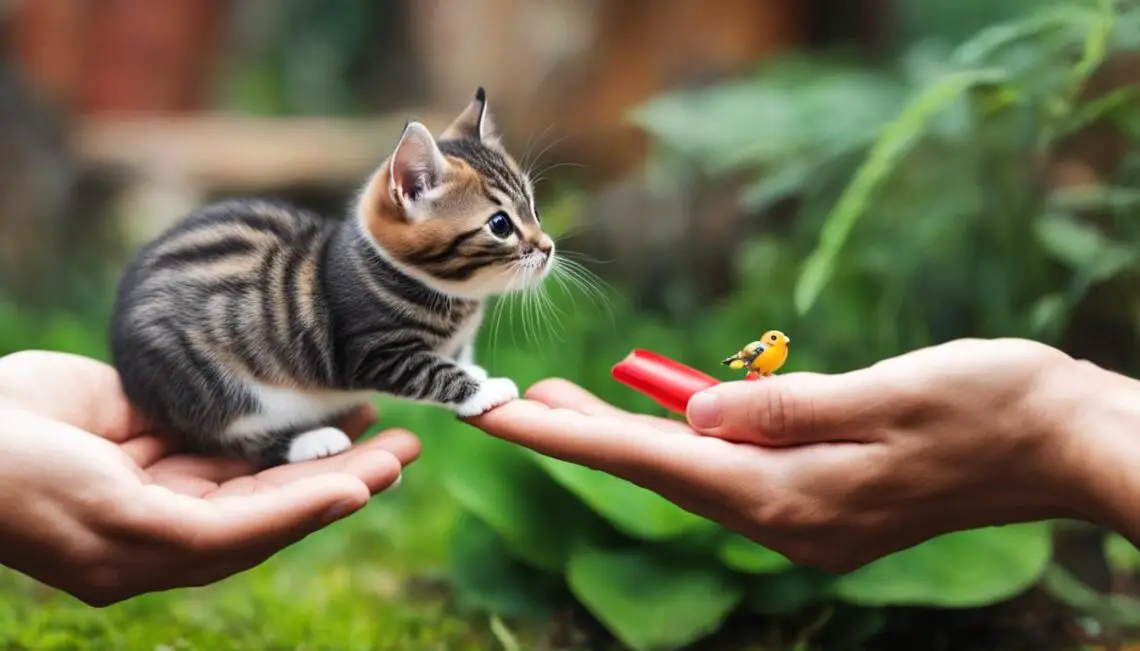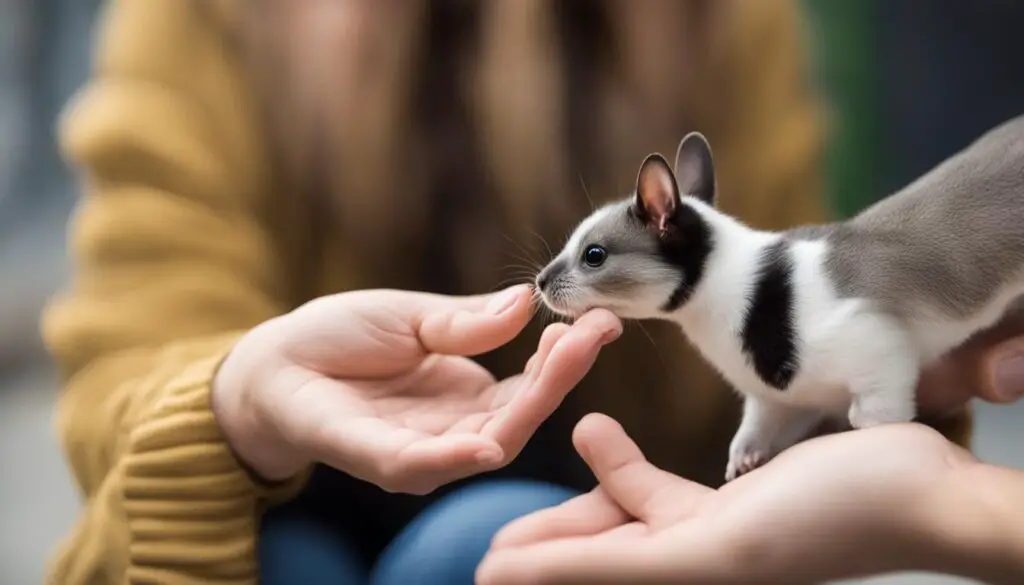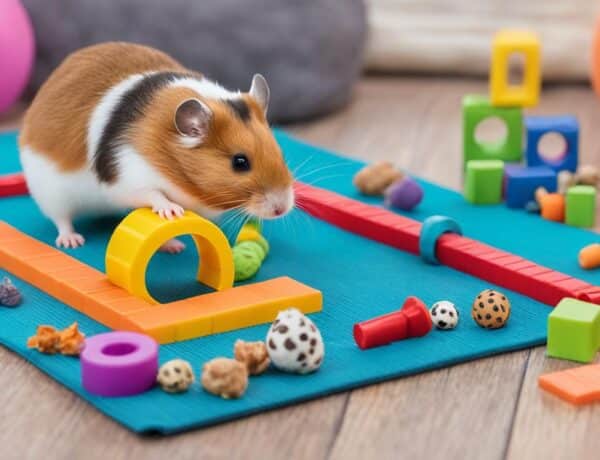Building trust with new small pets is essential for establishing a strong and lasting bond. Whether you have a dog or a cat, it’s important to understand the reasons why they may have trust issues and how trust impacts their mental health. By implementing trust-building techniques, such as reading their body language, respecting their space, and providing a safe environment, you can create a foundation of trust with your new small pet.
Key Takeaways:
- Building trust with new small pets is crucial for a strong bond.
- Understanding the reasons for trust issues in new small pets is important.
- Trust impacts a small pet’s mental health and well-being.
- Techniques like reading body language and respecting space can help build trust.
- Engaging in trust-building activities strengthens the bond with a small pet.
Reasons Your New Small Pet May Have Trust Issues
New small pets, such as dogs and cats, can develop trust issues due to various reasons. Lack of socialization as a puppy or kitten, not being exposed to different sights and sounds, and experiencing a traumatic event or abuse can all impact their ability to trust. Additionally, genetics and being in a new and unfamiliar situation, like recent adoption, can make it challenging for them to trust and warm up to their caregivers. It’s important to be aware of these potential factors and approach trust-building with patience and understanding.
When bringing a new small pet into your home, it’s essential to recognize that trust is not automatically given. They may have had negative experiences in the past or lack the necessary socialization to feel comfortable in new environments. Understanding the reasons behind their trust issues will help you develop a tailored approach to rebuilding their trust.
The lack of socialization during their early stages of development can significantly contribute to your new small pet’s trust issues. Puppies and kittens need exposure to various sights, sounds, and people to feel confident and secure in different situations. Without this early socialization, they may feel anxious and fearful, making it difficult for them to trust new people and environments.
Furthermore, a traumatic event or abuse can shatter your pet’s trust, leading to lasting emotional effects. Whether it’s a car accident, physical mistreatment, or a violent encounter with another animal, these experiences can leave your pet feeling vulnerable and hesitant to trust others. It’s crucial to understand that recovering from such traumatic events takes time and patience, as trust-building requires a safe and supportive environment.
Genetics also play a role in a new small pet’s ability to trust. Some breeds are naturally more cautious and wary of unfamiliar people or environments, which can make the trust-building process more challenging. Additionally, if your pet has recently been adopted or experienced a significant change in their living situation, such as moving to a new home, they may struggle to trust their new caregivers and environment due to the unfamiliarity and instability.
Approaching trust-building with your new small pet requires patience, understanding, and a gentle approach. Recognize that trust is earned and not something that can be forced. Give your pet time to adjust to their new surroundings and establish a routine that promotes feelings of security and consistency. Building trust with your new small pet may require setback and progress, but with consistent effort and positive reinforcement, you can help them overcome their trust issues and develop a strong bond based on trust and love.
Related Quotes:
“Traumatic events can have a lasting impact on a pet’s ability to trust humans. It’s our responsibility as caregivers to provide a safe and supportive environment to help them heal.” – Dr. Emma Thompson, Veterinarian
“Lack of socialization at an early age can lead to trust issues in pets. It’s crucial to expose them to different environments and people to build their confidence and trust.” – Sarah Johnson, Dog Trainer
Factors Contributing to Trust Issues in New Small Pets
| Factors | Description |
|---|---|
| Lack of Socialization | Insufficient exposure to different sights, sounds, and people during early development stages. |
| Traumatic Events | Experiencing accidents, abuse, or violent encounters that lead to emotional trauma. |
| Genetics | Some breeds may naturally be more cautious and skeptical of unfamiliar people and environments. |
| New and Unfamiliar Situations | Adoption or significant changes in living environments can create uncertainty and decrease trust. |
The Impact of Trust on a Small Pet’s Mental Health
Building trust with a small pet has a significant impact on their mental health. Trust allows them to feel safe and secure in their environment, reducing fear and anxiety.
When pets trust their caregivers, they are more likely to seek out positive interactions and show confidence in their daily interactions. On the other hand, pets that lack trust may exhibit fearful and anxious behaviors, such as shying away from affection, hiding, or showing aggression.
By building trust with your small pet, you can improve their overall well-being and strengthen your relationship. Trusting pets are happier, more relaxed, and better able to cope with stressful situations. They feel comfortable exploring their surroundings, interacting with new people and animals, and engaging in activities that promote their physical and mental stimulation.
Reducing Fear and Anxiety
Trust plays a crucial role in reducing the fear and anxiety experienced by small pets. When they trust their environment and the people around them, they feel less threatened and are more likely to approach new situations with confidence.
Trusting pets also have a higher tolerance for stressful events, such as vet visits or loud noises. Their confidence helps them navigate these situations with less fear and agitation, leading to better mental well-being.
Building Confidence and Positive Interactions
Trust empowers small pets to engage in positive interactions with their caregivers. When pets trust you, they are more likely to approach, seek affection, and participate in bonding activities. This increased confidence strengthens the bond between pet and caregiver, fostering a mutually beneficial and fulfilling relationship.
Confident pets are also more open to learning and training. They approach new experiences with a sense of security, making it easier for them to acquire new skills and behaviors. This not only enhances their mental health but also improves their overall quality of life.
Creating a Safe and Supportive Environment
By building trust, you are creating a safe and supportive environment for your small pet. Trust allows them to feel comfortable and protected in their surroundings, preventing them from constantly living in a state of fear.
“Trust is the foundation of any relationship, and it is no different when it comes to your relationship with your small pet. Without trust, your pet may struggle with anxiety, fear, and behavioral issues.”
By ensuring their needs are met, providing consistent care, and establishing clear boundaries, you create a reliable and nurturing environment that promotes their mental well-being and helps them thrive.
| Benefits of Building Trust | Consequences of Lack of Trust |
|---|---|
| – Reduced fear and anxiety | – Fearful and anxious behavior |
| – Increased confidence and positive interactions | – Avoidance of affection |
| – Better coping with stressful situations | – Hiding or aggression |
| – Enhanced learning and training abilities |
Building trust with your small pet is a long-term commitment, requiring patience, empathy, and a willingness to understand their unique needs and experiences. By creating an environment based on trust, you can help your small pet thrive mentally and emotionally, establishing a lasting and fulfilling bond.
Techniques to Build Trust with Your New Small Pet
Building trust with a new small pet takes time and patience. It’s essential to understand their unique needs and communication cues to establish a strong bond. By implementing the following techniques, you can gradually build trust and create a secure environment for your pet:
Read their Body Language
Understanding your pet’s body language can provide valuable insights into their feelings and comfort level.
Pay attention to their posture, tail position, facial expressions, and vocalizations. These subtle indicators can help you gauge their emotions and tailor your approach accordingly. For example, if your small pet is cowering or displaying signs of fear, it’s essential to give them space and reassurance to feel safe.
Respect their Space
Respecting your pet’s personal space is crucial in building trust and ensuring their comfort.
Avoid overwhelming them with sudden physical contact or invading their boundaries. Allow your pet to approach you at their own pace, and refrain from forcing interactions. This approach shows them that their boundaries are respected, creating a foundation of trust.
Approach at their Level
When approaching your small pet, make sure to get down to their level.
Bending down or sitting on the floor can help reduce their anxiety and make the interaction less intimidating. By meeting your pet at eye level, you convey a non-threatening presence and facilitate a sense of connection.
Offer Positive Reinforcement
Positive reinforcement is key to building trust and encouraging desired behaviors.
Reward your pet with treats, praise, and affection when they exhibit trust-building behaviors, such as approaching you willingly or showing signs of relaxation. This positive association reinforces their trust in you and strengthens your bond over time.
Maintain Consistency
Consistency is crucial in building trust and establishing a routine that your pet can rely on.
Stick to a consistent schedule for feeding, playtime, and training. This predictable routine helps your pet feel secure and reduces stress. When everyone in the household maintains consistent rules and expectations, it further reinforces trust and minimizes confusion for your small pet.
Provide a Safe Space
Creating a safe and comfortable environment is essential for building trust.
Give your small pet a designated space where they can retreat when they need alone time or a sense of security. This can be a bed, crate, or a quiet corner with their favorite toys. Respecting their need for privacy and downtime fosters trust and allows them to recharge.
By implementing these techniques, you can build trust with your new small pet and establish a strong foundation for a loving and secure relationship.
Engaging Trust-Building Activities for Your New Small Pet
Engaging in trust-building activities is an excellent way to strengthen the bond with your new small pet. By participating in these activities, you can establish a positive and trusting relationship that will contribute to their overall well-being and happiness.
Create Positive Associations
- Use rewards and treats to create positive associations with your presence. When your pet associates you with positive experiences, such as receiving treats or praise, they will develop trust and feel more comfortable around you.
- Practice regular and consistent feeding routines with your pet, as it helps create a positive association with you as their caregiver.
Playtime for Trust-Building
Playtime is not only a source of enjoyment for your pet but also an opportunity to build trust. Engage in interactive play sessions with toys, ropes, or balls to establish a sense of connection and bond with your pet. By playing together, you can build trust and make them feel secure in your presence.
Rewards-Based Training
Incorporating rewards-based training into your routine can significantly contribute to trust-building with your small pet. Positive reinforcement strengthens their confidence and reinforces desired behaviors. When your pet recognizes that certain behaviors result in rewards, they will feel motivated to trust your guidance. Consistency is key when using rewards-based training to build trust.
“Trust is built when they feel secure and loved in our presence.”
To provide further insight into rewards-based training and the positive impact it has on trust-building, refer to the table below:
| Rewards-Based Training Advantages | Examples |
|---|---|
| Strengthens the bond with your pet | Giving a treat after your pet follows a command |
| Boosts your pet’s confidence | Praising and giving rewards when they demonstrate a desired behavior |
| Encourages positive associations with training | Using verbal cues and treats to reinforce good behavior during training sessions |
By embracing engaging trust-building activities like creating positive associations, incorporating playtime, and rewards-based training, you can establish a trusting relationship with your new small pet. These activities enhance their well-being and strengthen the bond between you and your beloved companion.
Consistency and Predictability in Trust Building
Consistency and predictability are key elements in building trust with your new small pet. By maintaining a consistent routine, you provide a sense of security and reduce anxiety, allowing your pet to feel more at ease. This routine should include regular feeding schedules, walk times, and play sessions.
All family members should participate in this consistency, using the same words and commands when interacting with your pet. This ensures that your pet receives a consistent message and understands what is expected of them.
Additionally, it’s important to provide a safe space for your pet to retreat to when they need alone time. This can be a designated area in your home where they feel safe and protected. Respecting their need for alone time contributes to building trust as it shows them that their boundaries are respected.
By being consistent and predictable, you establish a stable environment that fosters trust and strengthens your bond with your new small pet.
Advantages of Consistency and Predictability in Trust Building
“Consistency is key in building trust with pets. When they know what to expect, it helps them feel safe and secure, which is essential for trust to develop.” – Dr. Sarah Anderson, Veterinarian
Consistency and predictability create a sense of routine and familiarity for your pet, which helps them feel more comfortable and secure. This routine becomes their baseline for trust-building, providing a solid foundation for their overall well-being.
Establishing consistency in your pet’s routine helps them understand what is expected of them and reduces uncertainty. This predictability allows them to anticipate events and interactions, minimizing surprise and anxiety. When your pet knows what to expect, they can focus on building trust and forming a strong bond with you.
Furthermore, consistency and predictability help in reinforcing positive behaviors. When your pet experiences consistent positive reinforcement for desired behaviors, trust is strengthened, and they learn to associate these behaviors with positive outcomes.
Consistency and Predictability Tips for Trust Building
| Tip | Description |
|---|---|
| Stick to a Routine | Establish consistent feeding, walking, and playtime schedules to create a predictable routine for your pet. |
| Use the Same Words and Commands | All family members should use consistent words and commands when interacting with your pet to avoid confusion. |
| Create a Safe Space | Designate a quiet, comfortable area where your pet can retreat to when they need alone time. Respect their boundaries and allow them to have space when desired. |
| Provide a Stable Environment | Avoid sudden changes or disruptions in your pet’s environment. Stability and predictability contribute to a sense of trust and security. |
Conclusion
Building trust with a new small pet is a process that requires time, patience, and understanding. By implementing trust-building techniques, engaging in trust-building activities, and maintaining consistency, you can establish a strong and lasting bond with your pet. Trust is the foundation for a positive and fulfilling relationship, and the effort put into building trust will ultimately result in a deeper and more meaningful connection with your new small pet.
Throughout this article, we have explored the reasons why a new small pet may have trust issues and the impact of trust on their mental health. We have discussed techniques such as reading their body language, respecting their space, and providing a safe environment to build trust. Engaging in trust-building activities, creating positive associations, and maintaining consistency and predictability are also crucial in building trust.
Remember, building trust with a new small pet is a journey. It may take time for them to feel comfortable and secure in their new environment. Be patient, understanding, and consistent in your approach. By investing in trust-building, you are investing in a strong and lasting bond with your new small pet, creating a relationship built on love, trust, and mutual respect.
FAQ
Why is building trust with new small pets important?
Building trust with new small pets is crucial for establishing a strong and lasting bond. It helps them feel safe and secure in their environment and reduces fear and anxiety.
What are some reasons a new small pet may have trust issues?
New small pets can develop trust issues due to factors such as lack of socialization, not being exposed to different sights and sounds, experiencing a traumatic event or abuse, genetics, and being in a new and unfamiliar situation.
How does trust impact a small pet’s mental health?
Trust has a significant impact on a small pet’s mental health. It allows them to feel safe and secure, reducing fear and anxiety. Trusting pets are more likely to seek out positive interactions and show confidence in their interactions with their caregivers.
What techniques can help build trust with a new small pet?
Techniques such as reading their body language, respecting their space, providing a safe environment, offering positive reinforcement, maintaining consistency, and providing a safe space can help build trust with a new small pet.
What are some trust-building activities for a new small pet?
Engaging in activities such as creating positive associations through rewards and treats, playtime, and rewards-based training can help build trust and strengthen the bond with a new small pet.
Why is consistency and predictability important in trust building?
Consistency and predictability provide a sense of security and reduce anxiety for a small pet. Maintaining a consistent routine and respecting their need for alone time contribute to building trust.
How can I establish a lasting bond with my new small pet?
By implementing trust-building techniques, engaging in trust-building activities, maintaining consistency, and providing a safe and stable environment, you can establish a strong and lasting bond with your new small pet.







No Comments